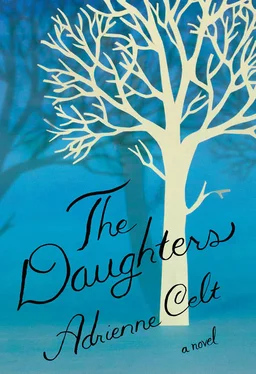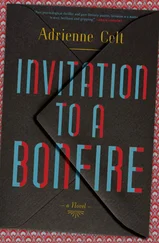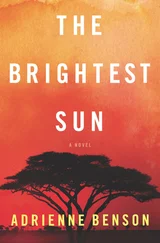“Eyesore,” I said. John shook his head.
“Nah.”
His pants were rolled up, his shoes and socks in one hand so he could step into the water and feel the cool sand. He paused, digging in his toes, and I stopped beside him. A wave rolled in all the way to my calves, eliciting an oh as it moved like an animal, up and around my legs. John’s hand went to the small of my back, making a counterpoint against the water on my skin.
“It’s like. ” His fingers moved against my spine, drumming out a pattern. “It’s not natural, I get it. Like a lightbulb. But those are islands in the middle of the ocean that help me see you in the dark. They make power.” He turned to me, smiling at himself. At his own romanticism. “That’s magic.”
We both dissolved into the water then; that’s how I remember it. Just so much sugar on the tongue.
But things change. Or at least they should — a person should. Moving with the tide of life, up and down. Letting yourself expand and shrink as the situation merits. You can become just as stuck in good stories as in bad habits, and then when things don’t go your way you fall hard. Tumbling through open air when the wave goes out from under you. I should know.
That night at dinner, before I got the call from Michelle, John had been complaining about his career. He wouldn’t call it complaining, just talking. He might even have thought he was being elegiac, telling me about some old tour from years ago. I’d heard it before, but I listened. Trying not to pay attention to the keen in his voice that asked, What happened between then and now, what changed? He wouldn’t have wanted me to tell him. He would have found it a strange interruption.
You can think about it like this. When singing a scale, the real difficulty is not in hitting the high notes or the low, regardless of range. The recognized test of a voice is its navigation of the passaggio : the space between the head, the middle, and the chest. The ability to move between different modes of being.
In a less-experienced singer, the passaggio transitions are all too noticeable; they jar like the gear shifts of a new driver. The timbre in the singer’s voice stutters and breaks, and the listener — probably incorrectly, but still — assumes they could do better themselves.
John has this trouble, and it costs him parts. Not as noticeably as in a beginner, but still. He takes the easy path into his head voice and ends up in a breathy falsetto that lacks support from his whole body. His whole range of possible sound. And he complains about it, making a case against the world. I know this about John: that he can be hard to listen to just as often as he is dramatic, heroic. A marvelous tenor. I am bound up in it too. My stories exist in his mouth, and I exist in them.
The man who requested the Tucson concert, the man whose birthday it was, had tried to book me before, once or twice. Though this was the first time he’d built me a stage.
“He heard you sing in Paris, I think,” Michelle told me over the phone. “He likes the best and brightest, you know the type. Richie Rich.” It didn’t matter to me, I said. It sounded too good to pass up. An experience, at least. “Just be careful with him,” she advised before hanging up.
“Careful? Why?”
“Oh, I don’t know.” Michelle was quiet for a second; I could hear her choosing her words. “He just strikes me as a collector.”
“A what?”
“Never mind.” She laughed. “I’m sorry, you’re right. It’ll be something, I’m sure.”
Ending the call, I curled my phone into my palm.
“I’m going to Arizona tomorrow,” I said. “Some guy’s party.”
John speared a long purple bean pod on the left-hand tine of his fork, considering it with more seriousness and focus than it quite deserved.
“You’ll have a good time, I bet,” he said. It wasn’t clear if he was angry or just thinking about something else. A musician of his caliber, though, is trained to control his voice and use it to express whatever emotion he needs in a given moment. No matter what he feels. He bit off one end of the bean and observed the steam piping out of the flesh that remained. “It’s nice to be impulsive.”
He wasn’t done talking, but I didn’t know that yet.
After deplaning in Tucson I was shuttled quickly into a Mercedes, plush with black leather. The assistant who’d been dispatched to fetch me handed over a bottle of cold water and asked if I was familiar with horses. She didn’t really appear to be listening so much as checking things off a list in her head.
I sipped, then frowned. “Should I be?”
She frowned too.
“It was part of the agreement.” Her voice kept an even pitch, but she crossed her legs so hastily that the heel of her boot snagged the cuffed edge of her jeans. Unhooking it with a thumb, she began typing into her phone with the other hand. I waited for a moment, but she didn’t look up.
The ranch, it turned out, was inaccessible by car, nestled in a valley between mountain crags. We arrived at the end of a long dirt road — the literal end, where the dirt track wavered and diminished into weeds and shale — and I stepped out into the sharp desert light, not sorry to be rid of the assistant. Guests were milling around in the dust, while ranch hands cinched soft leather saddles onto the horses.
The birthday gentleman, who went by Finn, came up and kissed my hand. He took off his hat to introduce himself as the owner of the ranch and wrangler of all the fine country folk around us. Finn’s hair was dark and disarrayed by sweat, his body thick but muscled. A 1950s sort of physique to match, it seemed, his manners.
“I heard you weren’t comfortable on pack animals,” he said. So he had to have a phone, hidden somewhere in all that rustic apparel. Full of urgent texts about me and my city-slick ways. “Perhaps you’d prefer to travel by carriage?”
I squinted at him, then at the stone and spiny plants around me.
“Is that even possible?”
“We can make miracles,” Finn said. “For your delicate sensibilities. The rest of us are basest cowboys.” He turned my hand over and kissed the soft skin of my wrist.
I pulled away.
“I can ride.” This was not true, but I didn’t think it could be very difficult — all the animals seemed sleek and gentle. And I didn’t like the way Finn looked at my skin like it was milk to be lapped up from a saucer.
His eyes were blue and inscrutable.
“As you wish,” he said.
Luckily the horses themselves were mild, because the passage was not particularly straightforward. There were many dips and divots in the trail; dry logs to jump over; spontaneous wells in the sand; and always, Finn riding up from behind me to make some obscure observation. He was a wellspring of information, pointing out the differences between the bleached skull of a dairy cow and that of a deer. The deer’s head was smaller and more tapered, but made to look somehow more substantial by still being attached to a ribbon of vertebrae. Finn called the cow a beef, and let his horse clatter its hooves over the half-smashed remnants.
“That one we call Bob or Bobo.” Finn pointed to a saguaro cactus some thirty meters off the trail with bubble arms growing off it in every direction. “We like to keep track of the freaks. There’s one about fifteen miles that way”—he waved a cupped hand behind him and to the left—“bent over like a horse, with a yucca growing right up through a hole in the middle. Damnedest thing.” He nodded to me, just a hint of a smile on his mouth. “Pardon the language, of course.”
Finn rode up and down the line of horses, laughing with some guests and favoring others with wild stories, making all of us stop dead and peer into the sun at a coyote loping across the middle distance. He seemed to transform depending on whom he was regaling, and so everyone loved him — a man who could pick people up and make them shine with his own reflected glow. Most of the time he left me alone; I wasn’t the only one there, not hardly. But every so often he spotted me and smiled, as if discovering me. Against my better judgment, his attention drew me in. The ebb and flow of it. The rare flashes.
Читать дальше












